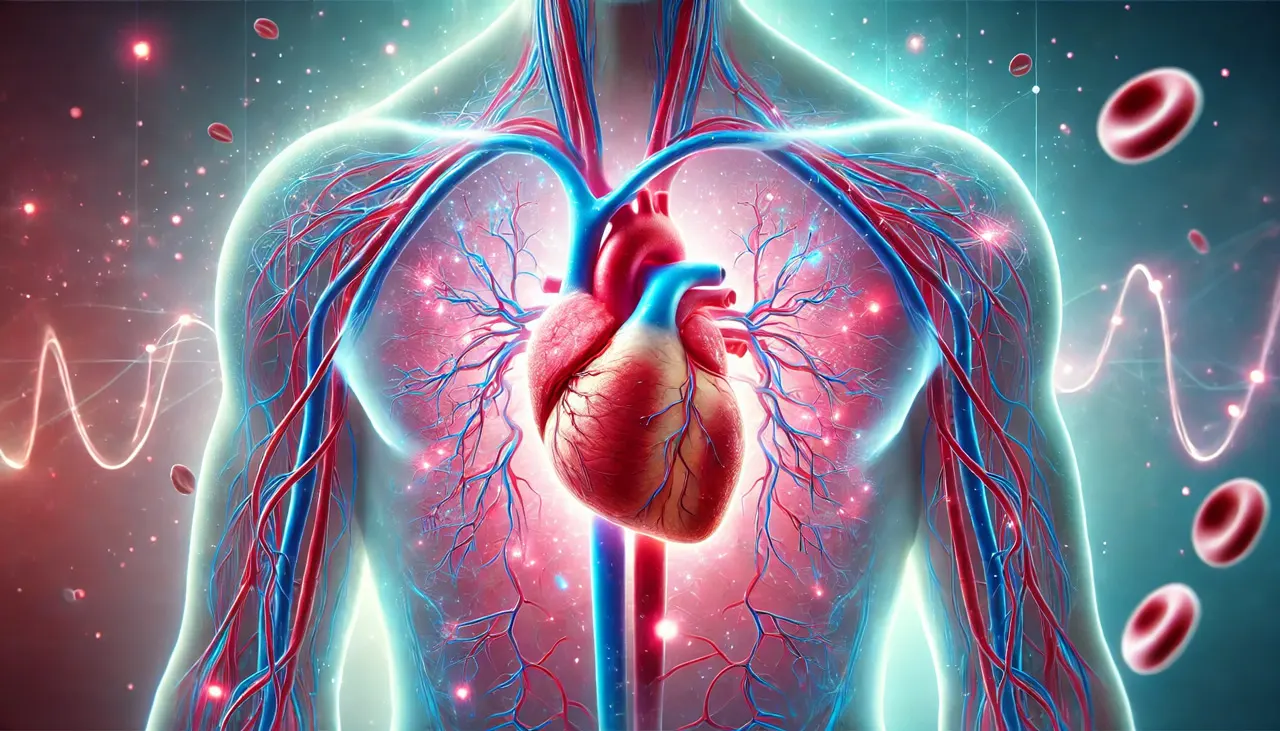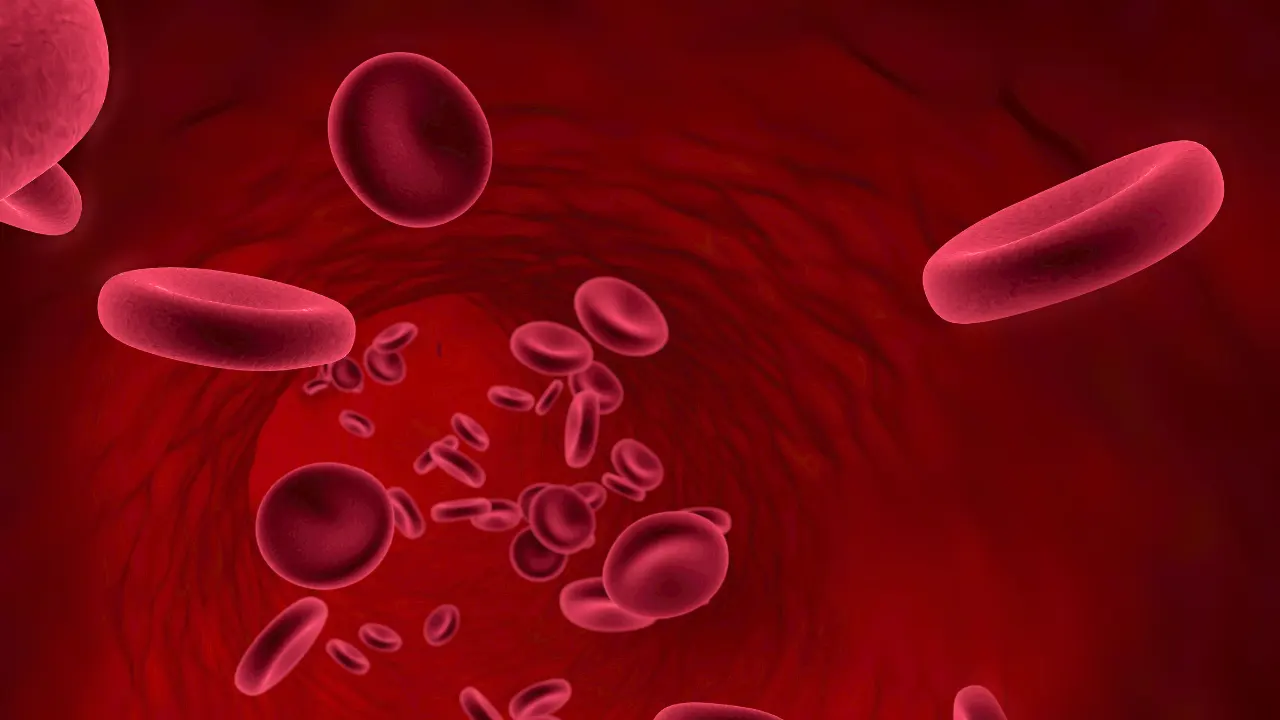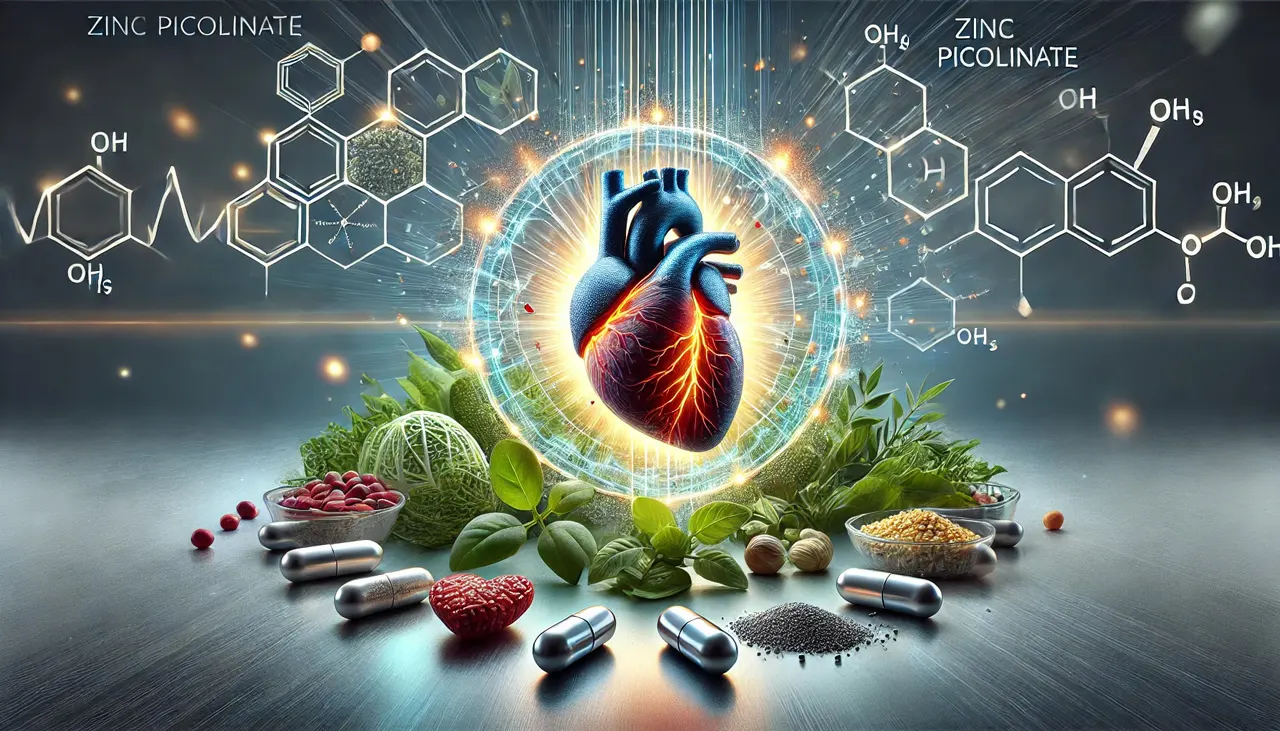Cardiovascular disease (CVD) remains the leading cause of death worldwide, accounting for approximately 18 million deaths annually, according to the World Health Organization (WHO). Risk factors such as hypertension, oxidative stress, and systemic inflammation contribute significantly to the development of heart disease. While medications and lifestyle changes are common strategies for managing cardiovascular risk, emerging research highlights the role of essential nutrients like zinc in promoting heart health.
Zinc picolinate, a highly absorbable form of zinc, offers unique benefits for supporting cardiovascular function, particularly in regulating blood pressure and reducing inflammation. This article delves into zinc picolinate’s role in cardiovascular health, its mechanisms of action, and the clinical evidence supporting its heart-healthy benefits.
You May Also Like:
Zinc Picolinate for Oral Health: Strengthening Teeth and Gums
Zinc Picolinate and Cardiovascular Health: A Heart-Healthy Choice is an original (HSLHealing) article.
The Importance of Cardiovascular Health
The cardiovascular system, composed of the heart, blood vessels, and blood, is responsible for delivering oxygen and nutrients to tissues. Maintaining cardiovascular health is essential for preventing conditions such as:
- Hypertension: High blood pressure, a major risk factor for stroke and heart attacks.
- Atherosclerosis: Hardening of the arteries due to plaque buildup.
- Heart Failure: The inability of the heart to pump blood effectively.
Proper cardiovascular function depends on a balanced diet, regular physical activity, and adequate levels of key nutrients, including zinc.

Zinc’s Role in Cardiovascular Health
Zinc is a trace mineral involved in over 300 enzymatic processes, many of which are critical for maintaining heart health and vascular integrity:
- Antioxidant Defense: Zinc is a co-factor for superoxide dismutase (SOD), an enzyme that neutralizes free radicals, protecting the heart and blood vessels from oxidative damage.
- Regulating Blood Pressure: Zinc influences vascular tone by modulating the production of nitric oxide (NO), a molecule that relaxes blood vessels and lowers blood pressure.
- Anti-Inflammatory Effects: Zinc reduces the activity of pro-inflammatory cytokines, mitigating chronic inflammation associated with atherosclerosis and other cardiovascular diseases.
- Lipid Regulation: Zinc plays a role in maintaining healthy cholesterol levels by modulating lipid metabolism.
What Is Zinc Picolinate?
Zinc picolinate is a chelated form of zinc, where zinc is bound to picolinic acid, a compound naturally produced by the body. This structure enhances zinc’s absorption and bioavailability, making it an effective choice for supplementation, particularly for individuals seeking to support cardiovascular health.
The Link Between Zinc Deficiency and Cardiovascular Disease
Zinc deficiency is a global concern, affecting nearly 17% of the population according to the WHO. Risk factors for deficiency include poor dietary intake, chronic illnesses, and increased zinc loss due to stress or medication use.
Impact of Zinc Deficiency on Cardiovascular Health:
- Increased oxidative stress and inflammation, contributing to endothelial dysfunction.
- Impaired nitric oxide production, leading to hypertension.
- Elevated cholesterol and triglyceride levels, increasing the risk of atherosclerosis.
Statistics:
- A study in Journal of Trace Elements in Medicine and Biology found that individuals with lower serum zinc levels had a 25% higher risk of developing hypertension.

How Zinc Picolinate Supports Cardiovascular Health
1. Regulating Blood Pressure
Zinc picolinate enhances the production of nitric oxide (NO), a molecule critical for vasodilation, or the widening of blood vessels. This process reduces vascular resistance and lowers blood pressure.
- Research Insight: A study published in Hypertension Research found that zinc supplementation improved endothelial function and reduced systolic blood pressure in individuals with hypertension.
2. Reducing Oxidative Stress
Zinc acts as an antioxidant, neutralizing free radicals that damage blood vessels and contribute to atherosclerosis. By supporting antioxidant enzymes like SOD, zinc protects the cardiovascular system.
- Study Finding: Research in Free Radical Biology and Medicine demonstrated that zinc supplementation reduced oxidative stress markers in individuals at risk for heart disease.
3. Mitigating Inflammation
Chronic inflammation is a key driver of cardiovascular disease. Zinc reduces the activity of pro-inflammatory cytokines such as interleukin-6 (IL-6) and tumor necrosis factor-alpha (TNF-α).
- Clinical Evidence: A study in Nutrients showed that zinc supplementation lowered inflammatory markers in adults with metabolic syndrome, improving cardiovascular risk profiles.
4. Improving Lipid Metabolism
Zinc supports the regulation of cholesterol and triglycerides, reducing the risk of atherosclerosis and related complications.
- Study Insight: A clinical trial in American Journal of Clinical Nutrition found that zinc supplementation reduced LDL cholesterol levels while increasing HDL cholesterol in participants with dyslipidemia.

Clinical Studies on Zinc and Cardiovascular Health
Zinc and Lipid Profiles (2017):
A clinical trial in Journal of Clinical Lipidology found that zinc supplementation improved lipid profiles, reducing LDL cholesterol by 10% and increasing HDL cholesterol by 15%.
Zinc and Hypertension (2015):
A randomized controlled trial in Hypertension Research evaluated the effects of zinc supplementation in individuals with high blood pressure. Participants receiving 30 mg of zinc daily for 12 weeks experienced significant reductions in systolic and diastolic blood pressure compared to the placebo group.
Zinc and Atherosclerosis (2018):
Research published in Atherosclerosis examined the role of zinc in preventing plaque buildup. Results showed that zinc supplementation reduced arterial stiffness and inhibited the progression of atherosclerosis in animal models.
Zinc and Inflammation (2020):
A study in Journal of Trace Elements in Medicine and Biology assessed zinc’s impact on inflammatory markers. Supplementation reduced CRP (C-reactive protein) levels, a key marker of systemic inflammation linked to cardiovascular disease.
Support Healthy Heart Rhythm and Vitality with Zinc Picolinate Supplements—Shop Amazon’s Best Now!

Dietary Sources of Zinc
While zinc picolinate supplementation is effective, incorporating zinc-rich foods into your diet is also beneficial. Foods high in zinc include:
- Animal-Based Sources: Oysters, beef, poultry, and eggs.
- Plant-Based Sources: Legumes (e.g., chickpeas, lentils), seeds (e.g., pumpkin seeds, sunflower seeds), and nuts (e.g., cashews, almonds).
Vegetarians and vegans may require supplementation due to the lower bioavailability of zinc in plant-based foods.
Recommended Dosage and Safety
The recommended dietary allowance (RDA) for zinc is:
- Adult men: 11 mg/day
- Adult women: 8 mg/day
For supporting cardiovascular health, therapeutic doses of zinc picolinate typically range from 20–40 mg/day. However, excessive zinc intake (above 40 mg/day) can cause:
- Nausea and gastrointestinal discomfort
- Reduced copper absorption, potentially leading to deficiencies
Always consult a healthcare provider before starting supplementation to ensure the appropriate dosage.hcare provider before starting any supplementation to confirm if it’s the right dosage for you.
Protect Your Heart and Support Healthy Cholesterol Levels with Zinc Picolinate—Shop Now on Amazon!

Combining Zinc Picolinate with Other Nutrients
Zinc picolinate works synergistically with other nutrients to support cardiovascular health:
- Magnesium:
Magnesium aids in blood pressure regulation and complements zinc’s effects on vascular health. - Vitamin D:
Vitamin D supports calcium regulation and reduces inflammation, enhancing zinc’s cardiovascular benefits. - Omega-3 Fatty Acids:
Omega-3s reduce triglycerides and improve arterial flexibility, working alongside zinc to protect the heart. - Coenzyme Q10 (CoQ10):
CoQ10 supports mitochondrial function and energy production in heart cells, amplifying zinc’s antioxidant properties.
Future Research Directions
While substantial evidence supports zinc’s role in cardiovascular health, further research is needed to explore:
- The long-term effects of zinc picolinate on cardiovascular disease outcomes.
- Synergistic effects of zinc with other micronutrients and medications.
- Zinc’s impact on specific populations, such as those with diabetes or chronic kidney disease.
Conclusion: Zinc Picolinate as a Heart-Healthy Choice
Zinc picolinate offers a scientifically supported, natural approach to promoting cardiovascular health. By regulating blood pressure, reducing inflammation, combating oxidative stress, and improving lipid metabolism, zinc picolinate addresses key risk factors for heart disease. For individuals looking to optimize heart health, incorporating zinc picolinate into a balanced diet and lifestyle plan can provide significant benefits. As always, consult with a healthcare provider to tailor supplementation to your individual needs and ensure safe and effective use.

References
- Zinc in Cardiovascular Functions and Diseases: Epidemiology and Molecular Mechanisms for Therapeutic Development. Retrieved from: https://pmc.ncbi.nlm.nih.gov/articles/PMC10139119/
- The Critical Roles of Zinc: Beyond Impact on Myocardial Signaling. Retrieved from: https://pmc.ncbi.nlm.nih.gov/articles/PMC4553398/
- Investigating the Role of Zinc in Atherosclerosis: A Review. Retrieved from: https://pmc.ncbi.nlm.nih.gov/articles/PMC9599385/
- Zinc Supplementation Alleviates Lipid and Glucose Metabolic Disorders Induced by a High-Fat Diet. Retrieved from: https://pubmed.ncbi.nlm.nih.gov/32290656/
- Quantifiable effects of regular exercise on zinc status in a healthy population—A systematic review. Retrieved from: https://pmc.ncbi.nlm.nih.gov/articles/PMC5607172/
- Enhanced aerobic exercise performance in women by a combination of three mineral Chelates plus two conditionally essential nutrients. Retrieved from: https://jissn.biomedcentral.com/articles/10.1186/s12970-017-0199-2
- Effects of zinc supplementation on inflammatory biomarkers and oxidative stress in adults: A systematic review and meta-analysis of randomized controlled trials. Retrieved from: https://pubmed.ncbi.nlm.nih.gov/34560424/
Important Note: The information contained in this article is for general informational purposes only, and should not be construed as health or medical advice, nor is it intended to diagnose, prevent, treat, or cure any disease or health condition. Before embarking on any diet, fitness regimen, or program of nutritional supplementation, it is advisable to consult your healthcare professional in order to determine its safety and probable efficacy in terms of your individual state of health.
Regarding Nutritional Supplements Or Other Non-Prescription Health Products: If any nutritional supplements or other non-prescription health products are mentioned in the foregoing article, any claims or statements made about them have not been evaluated by the U.S. Food and Drug Administration, and such nutritional supplements or other health products are not intended to diagnose, treat, cure, or prevent any disease.

